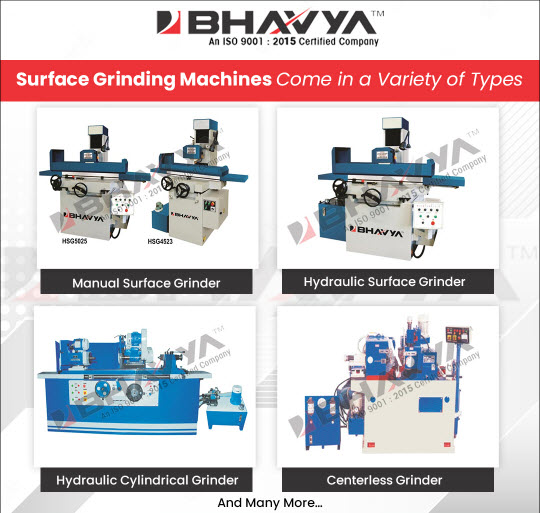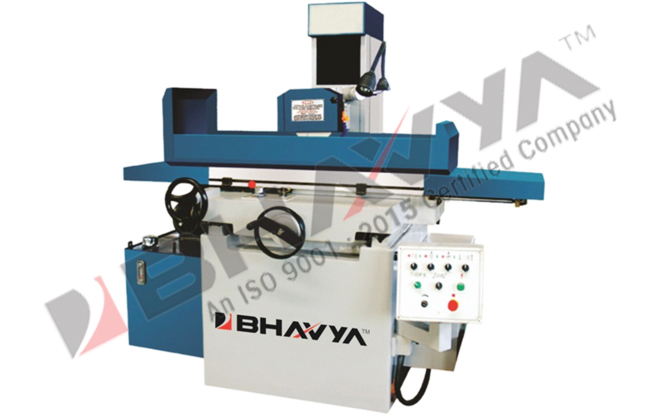Introduction
Surface grinding machines are indispensable tools used for achieving precise and smooth surfaces. With the ability to remove any surface irregularities, they play a vital role in various industries, including automotive, aerospace, metalworking, and construction. The surface grinder works by using a grinding wheel to achieve a flat, smooth finish on metal or other materials. The robust construction and versatility of surface grinding machines make them essential for applications that require high levels of accuracy and quality.
This article focuses on the key features, types, and applications of surface grinding machines, with a special emphasis on hydraulic surface grinders, including their benefits in modern machining processes.
What is a Surface Grinding Machine?
A surface grinding machine is designed to provide a high degree of surface smoothness and precision by using a grinding wheel to remove excess material from the surface of a workpiece. The machine works by moving the grinding wheel back and forth across the surface, leveling out any irregularities and creating a perfectly flat surface.
Surface grinding machines are commonly used for the final stages of production, where flat and smooth surfaces are essential. These machines are used for various applications such as deburring, finishing, and polishing metal parts and components.
Key Features of Surface Grinding Machines
- Grinding Wheels for Abrasive Surfaces The most critical component of a surface grinding machine is its grinding wheel. The wheel is designed with abrasive materials capable of removing unwanted material from the surface of the workpiece, making it flat and smooth. Different grinding wheels can be used depending on the material being worked on and the desired finish.
- Forward and Backward Motion The grinding machine operates by moving forward and backward across the workpiece. This movement allows the abrasive wheel to continuously grind down the surface, ensuring that all irregularities are removed. The precision of this movement ensures uniformity across the surface.
- Manual or Automatic Operation Surface grinding machines are available in both manual and automatic versions. In manual surface grinders, the operator uses a lever to manually position the workpiece against the rotating grinding wheel. This method provides hands-on control over the grinding process. In contrast, automated or CNC surface grinders are designed for high-volume production, where the grinding process is fully automated, allowing for faster, more precise, and consistent results.

Hydraulic Surface Grinding Machines
Hydraulic surface grinding machines are a specialized type of surface grinder that utilizes hydraulic power to generate force and improve efficiency. Bhavya Machine Tools supplies an extensive range of hydraulic surface grinders, known for their superior performance and durability. These machines are primarily used for grinding metals and other materials, offering enhanced precision and smoother finishes.
- Hydraulic Power for Efficiency The hydraulic surface grinder relies on a hydraulic system to generate power, which in turn drives the grinding process. The use of hydraulic power allows for smoother and more consistent operation, minimizing the effort required by the operator. It also ensures that the machine can handle more demanding tasks, making it ideal for high-volume production environments.
- Flat and Smooth Surface Finishing Hydraulic surface grinders are particularly well-suited for producing flat and smooth surfaces, which are critical in industries such as automotive, aerospace, and metal fabrication. These machines can grind down metal workpieces with unparalleled precision, creating surfaces that meet stringent industry standards.
- Improved Control and Accuracy The hydraulic system provides greater control over the grinding process, allowing for precise adjustments to be made as needed. This results in higher levels of accuracy, particularly in applications where tight tolerances are required. The hydraulic system ensures that the machine maintains a consistent grinding force, improving the overall quality of the finished product.
- Durable and Low-Maintenance Hydraulic surface grinders are built for long-term durability, with components designed to withstand heavy-duty usage. Their robust construction ensures that they can handle tough materials and high workloads. Additionally, the hydraulic system requires minimal maintenance, reducing downtime and ensuring consistent productivity over time.
Applications of Surface Grinding Machines
- Automotive Industry In the automotive industry, surface grinding machines are used to ensure the precision and smoothness of engine components, brake parts, and transmission systems. The flat and smooth surfaces produced by these machines ensure the proper fit and function of automotive parts, leading to improved performance and safety.
- Aerospace Industry Aerospace manufacturing demands extremely high levels of accuracy, as even the slightest imperfection can compromise the performance of aircraft components. Surface grinding machines are widely used to grind and finish critical components such as turbine blades, engine parts, and landing gear systems.
- Metalworking and Tool Rooms Surface grinding machines are an essential tool in metalworking and tool rooms, where they are used to create flat surfaces on metal workpieces. They are especially useful for shaping and finishing die molds, machine parts, and other metal components that require precision.
- Construction and Fabrication In construction and fabrication, surface grinding machines are used for finishing and polishing metal plates, beams, and other structural components. They ensure that metal surfaces are smooth and free of imperfections, which is important for the aesthetic and functional quality of construction materials.

Benefits of Using Surface Grinding Machines
- High Precision and Accuracy Surface grinding machines are designed to deliver high levels of precision and accuracy, ensuring that workpieces meet exact specifications. The ability to produce flat, smooth surfaces makes these machines essential for applications where quality and consistency are critical.
- Improved Surface Finish The grinding process creates a smooth, flat surface, which is essential for parts that need to fit together perfectly or require a high-quality finish. Surface grinding machines are ideal for producing polished finishes on metal parts, improving both the aesthetic and functional aspects of the final product.
- Versatility in Application Surface grinding machines are highly versatile and can be used with a variety of materials, including metals, plastics, and composites. This versatility makes them suitable for a wide range of industries and applications, from automotive manufacturing to construction and tool-making.
- Cost-Effective and Efficient The efficiency of surface grinding machines makes them a cost-effective solution for businesses looking to achieve high-quality results. With their ability to handle high-volume production and produce consistent results, these machines reduce material waste and minimize rework, ultimately lowering production costs.
Conclusion
Surface grinding machines are essential tools in modern machining, providing the precision, accuracy, and efficiency needed to meet the demands of various industries. Whether used for finishing metal components in the automotive, aerospace, or metalworking sectors, surface grinders offer unparalleled performance in producing smooth and flat surfaces.
Hydraulic surface grinding machines, in particular, offer enhanced efficiency and control, making them a valuable asset for industries that require high-performance grinding solutions. Bhavya Machine Tools continues to lead the market by offering a comprehensive range of surface grinders designed to meet the diverse needs of today’s industrial landscape.
Investing in a surface grinding machine is a smart choice for businesses looking to improve the quality, precision, and efficiency of their machining processes, ensuring that they stay competitive in an ever-evolving market.





